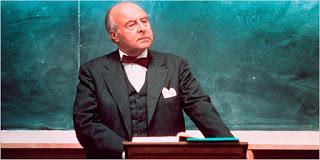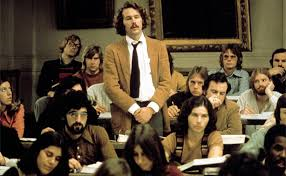
"Speak louder, Mr. Hart! Fill the room with your intelligence!"
Imagine trying to sell The Paper Chase (1973) to any studio, then or now: two hours of harried twentysomethings arguing minutia in contract law and scrambling to complete exams isn't the most exciting premise. Somehow, writer-director James Bridges pulls it off.James Hart (Timothy Bottoms) arrives at Harvard Law with endless energy and bottomless ambition. His hopes are dashed by the daily grind of legal life, capped by his contract law professor, Mr. Kingsfield (John Houseman). Hart grows fascinated by his professor, trying to pierce his armored exterior while mastering his subject. Hart's predicament becomes even more complicated when he starts dating Kinsfield's daughter Susan (Lindsay Wagner).
Based on John Jay Osborn Jr.'s novel, The Paper Chase works by framing itself in slice of life terms. Bridges evokes a Harvard whose young students become grist to an intellectual mill, driven to extremes in pursuit of grades and prestige. Hart, a driven but not particularly exceptional student, proves more grounded than his colleagues. Kevin (James Naughton) contemplates suicide and Bell (Craig Richard Nelson) hordes his notes for personal pursuit. It's an environment where success becomes interchangeable with self-destruction.
To outside viewers, The Paper Chase's dramaturgy may seem extreme. Yet more than one of my friends burned out of law school, finding its exigencies unbearable. Bridges makes their plight hellish and futile in an almost existential fashion; one key sequence shows Kingsfield enlisting Hart for research assistance. Despite working 72 straight hours, Hart fails. No matter how hard he works, Hart will never be more than a name on the Professor's seating chart.

Bridges' direction makes Chase compelling; potentially dry lectures become barbed duels, as Kingsfield contemptuously challenges his students with barbed insults and ego-pricking challenges. Similarly, scenes like Hart frantically researching a paper become compelling staged in frenetic montage. Gordon Willis's photography distances its characters, framing confrontations in long shot; the study group bickering through a glass door, Hart and Susan's lakeside flirtation, Hart reading Kingsfield's notes amidst filing cabinets. Its combats are intensely intimate yet unbridgeable.
Timothy Bottoms makes a fine lead, amiably scruffy and eager, his youthful intentions giving way to sour disillusionment. John Houseman plays Kingsfield with impenetrable hauteur, letting humanity slip out only in fleeting gestures and stabs of savage humor. Lindsay Wagner is sweet but her character lacks the strong grounding to stand out. Hart's colleagues include Graham Beckel, James Naughton, Edward Herrman, Richard Craig Nelson and Robert Lydiard.
The Paper Chase proved popular enough to spawn a television series (with John Houseman reprising his role), while law students still embrace it as a pitch-perfect rendering of their educational hell. Even outside viewers can appreciate its effective storytelling, showing young minds consumed by ambitions, molded by institutions... and some eventually graduate.

